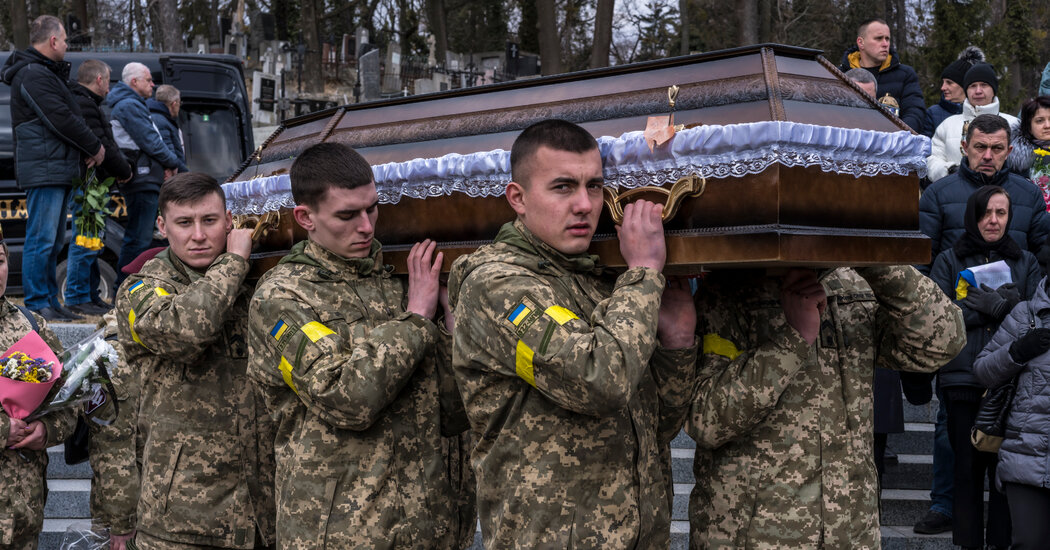
One million children have fled Ukraine in less than two weeks of war, James Elder, a spokesman for UNICEF, said on Tuesday, calling it “a dark historical first.”
Since the start of the Russian invasion on Feb. 24, two million people have fled Ukraine, according to the U.N. — more than those who left Syria in the first three years of the civil war there.
“We have not seen a refugee crisis of this speed and scale since World War II,” Mr. Elder said. “and this is a children crisis.”
About one in seven Ukrainian children have already left the country. At least 29 have been killed, by bombings or by mortar shells, in the street as they tried to escape, a figure that humanitarian groups say is almost certainly an underestimate. Since the start of the conflict, UNICEF estimates that 4,000 babies have been born in Ukraine “including dozens in makeshift maternity wards and underground shelters,” the agency said in a statement to The New York Times.
“Despite the best efforts of doctors and midwives, they are setting up I.C.U.s or surgeries in basements and bunkers — no way it can be as safe as where a child should be born,” Mr. Elder said.
In some areas, families are living without electricity and water, with children exposed to the cold, disease, hunger and thirst. Families from Mariupol recounted that some children drank water from water heaters, Mr. Elder said.
Catherine M. Russell, the executive director of UNICEF, called the situation of children in Ukraine “a moral outrage,” and said that countless of them were traumatized.
In a bunker near her home in Kharkiv, 5-year-old Eva Zozulia learned how to distinguish the sound of Ukrainian and Russian artillery before she and part of her family fled the city. The first produced only loud “booms” but when the Russians struck, the whole building trembled.
“It was scary,” Eva said in a phone call from the train station in the western city of Lviv, where she had spent the previous night, sleeping in a restaurant with her mother and older brother.
Many of the children fleeing are unaccompanied, according to a U.N. statement. Their parents or family members stayed in Ukraine, or were killed, Mr. Elder said, adding that he had met a mother who was traveling with her three children and three children of her sister, with whom she had lost contact.
About 100,000 children, half of them with disabilities, are living in institutions and boarding schools that are at risk, as schools, orphanages, homes and hospitals had all come under attack, the U.N. said.
Rev. Vyacheslav Grynevych, the executive director of Caritas-Spes, a Ukrainian Latin Catholic charity, said the group took in 200 children with their mothers in a center in the ski resort of Yablunytsia, in Western Ukraine.
Rev. Grynevych said in a phone call from Yablunytsia that while many orphans had left Ukraine, his organization was still trying to coordinate the evacuation of many of them who are still in bomb shelters around the country, sometimes alone.
Children have also shown great resilience, from singing in bomb shelters to undertaking trips alone to join relatives abroad. Vardkes Arzumanyan, a restaurant owner who has been distributing meals at the Lviv train station, said he saw a child tearing the piece of the cardboard he was sitting on, to offer part of it to a stranger.
Most of the Ukrainian refugees in other countries are women and children, because men between the ages of 18 and 60 are not allowed to leave. But to some mothers, their 18-year-old sons are still children.
Eva Zozulia’s brother Kyryll, a high school student, turned 18 on March 1, a day before the family fled Kharkiv.
“He is not prepared,” said Irene Zozulia, Eva and Kyryll’s mother. “The only way in which he could help is go in front of a Russian soldier and say, ‘kill me.’”




